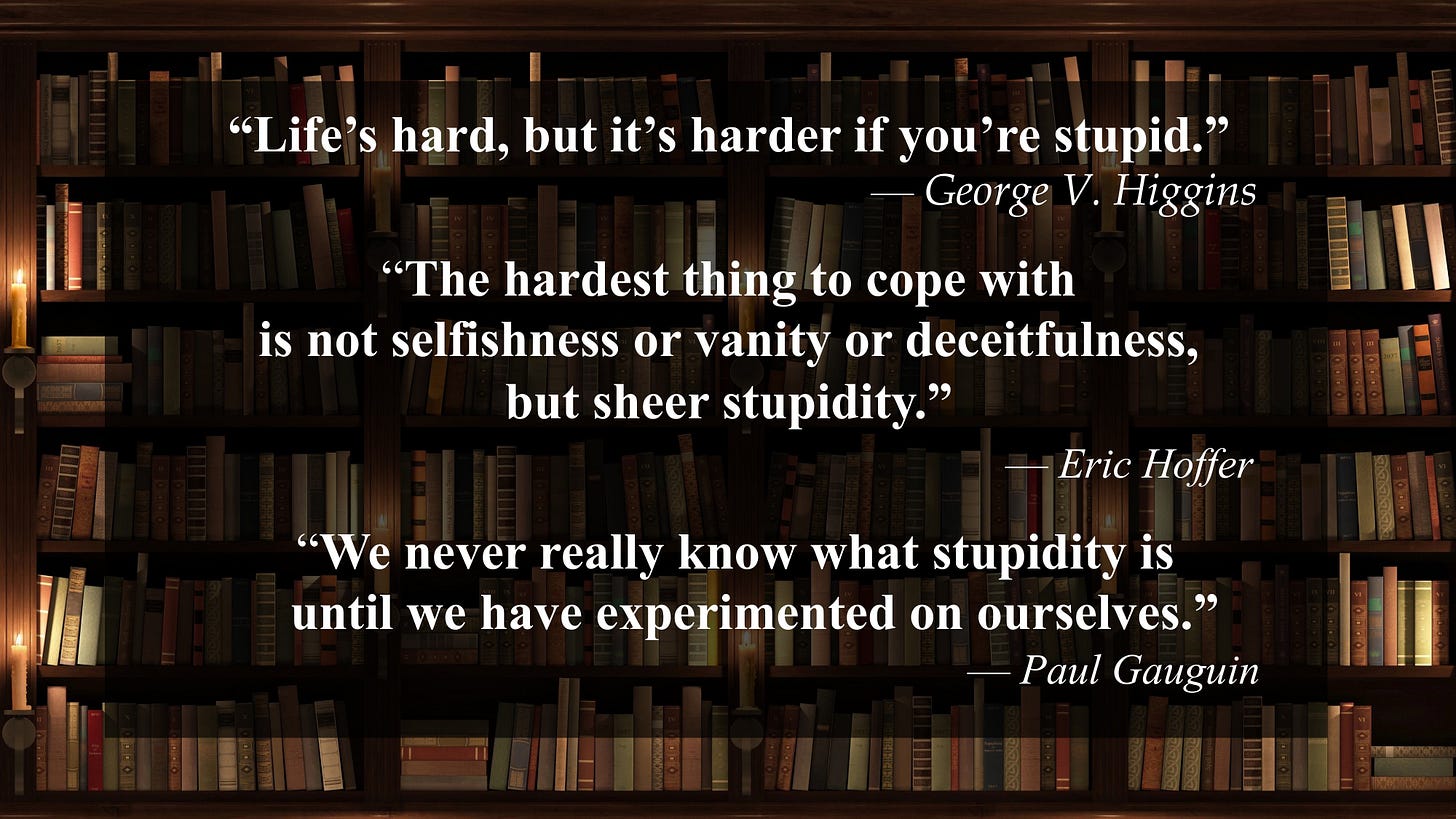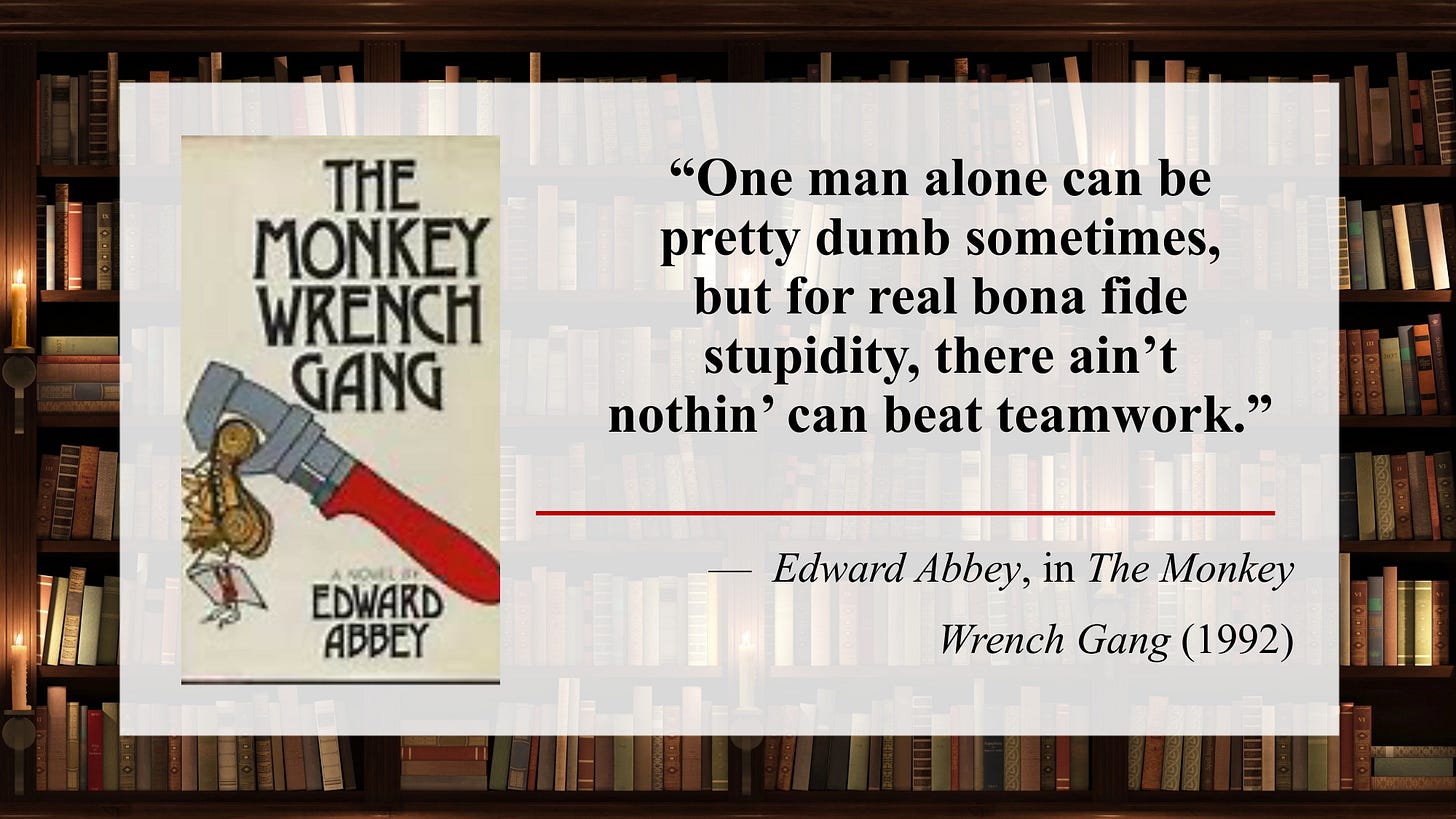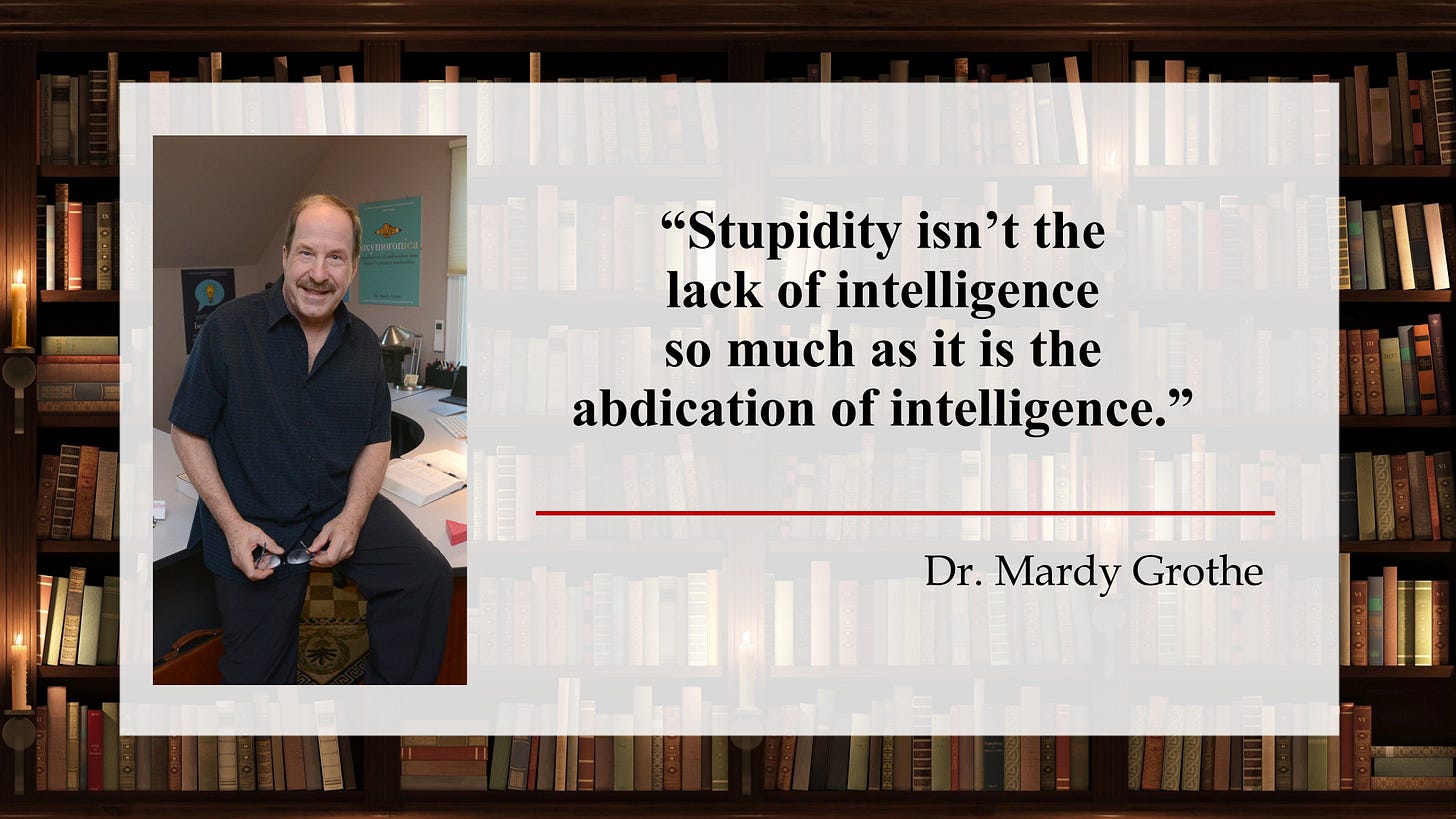Dr. Mardy's Quotes of the Week (Self-Directed Stupidity")
Nov. 17—23, 2024 | THIS WEEK'S THEME: “Self-Directed Stupidity"
Find Me a GOL, Get a Personally-Inscribed Book!
I have a little over a month to finish my compilation of “The 24 Best Opening Lines of 2024,” and I could use a little help in completing my work. There’s even something in it for those who do.
If you send me a Great Opening Line (GOL) from a 2024 book that I have not already identified and it makes my end-of-the-year list, I’ll send you a signed and personally-inscribed copy of one of my books. The offer holds for everyone, so pass the word along. Simply e-mail nominations to: drmardy@drmardy.com
This will be my fifth annual compilation, all of which appeared in Michael Smerconish’s popular newsletter. You can find links to the first four here.
To give you an example of what I’m looking for, here’s one of my 2024 selections, along with some brief commentary:
Most celebrity memoirs don’t begin with a literary flourish, but Selleck’s in media res (“In the middle of things”) opening describes the first moments of a terrifying car accident. In the opening paragraph, Selleck continued:
“Everything after that seemed to slow down. I was in the passenger seat as the car floated in the air, turning over on its axis. We had been bowling, and the two bowling balls flew around the cabin, seeking and all too often finding their target. It was a dark night, and I couldn’t see where the descent was taking us. Then I felt a painful, overwhelming crunch as the car hit the ground upside down.”
Selleck’s exceptionally well-written description puts readers smack-dab in the middle of an out-of-control car that is turning over in mid-air before landing on its roof. The tantalizing detail about two bowling balls floating around in the overturned car gives the scene a quality of verisimilitude it might have lacked had they not been mentioned.
Great Opening Line of the Week
This first sentence immediately draws the reader in, and, as the narrator continues in the opening paragraph, he reveals two additional items of interest: one, he’s an older man who is thinking not about youth in general, but his own youthful stupidity; and, two, that he was confined to a wheelchair at the time:
“When I was twenty-two I enrolled in philosophy at Columbia University. I wanted to find truth. I hired helpers to wheel me to it.”
For nearly 2,000 memorable opening lines from every genre of world literature, go to www.GreatOpeningLines.com.
This Week’s Puzzler
On November 18, 1939, this woman was born in Ottawa, Ontario, Canada (she celebrates her 85th birthday this week). The second of three children born to a dietician mother and an entomologist father, she spent her first seven years living half the year in Ottawa and the other half in the backwoods of northern Quebec, where her father was doing research at a government forestry station. Many years later, she wrote: “At the age of six months, I was carried into the woods in a packsack, and this landscape became my hometown.”
The isolated setting resulted in a love of reading and early dreams of a writing career (she wrote her first play at age seven). At age eight, after moving with her family to Toronto, she experienced great difficulty relating to girls her own age. In her memoir Negotiating with the Dead (2002), she described it this way:
“I was now faced with real life, in the form of other little girls—their prudery and snobbery, their Byzantine social life based on whispering and vicious gossip, and an inability to pick up earthworms without wriggling all over and making mewing noises like a kitten.”
She ultimately went on to study at the University of Toronto (B.A., 1961), Radcliffe (M.A., 1963), and Harvard (completing course work for a Ph.D. but never finishing a dissertation). She has written over fifty books, beginning with a volume of poetry in 1961 (Double Persephone). Her most recent work was a collection of short stories titled Old Babes in the Wood (2023). A few decades ago, she replaced Robertson Davies as Canada’s most famous writer, and she is now one of the world’s most celebrated writers.
Her best known work is The Handmaid’s Tale (1985), a dystopian novel that is widely regarded as a literary classic. In 2017, it became a modern cultural phenomenon when the streaming service Hulu adapted it into a TV series, with Elisabeth Moss in the starring role. After the first season, it dominated the awards shows, and it continues to receive rave reviews as it prepares for a sixth and final season in 2025.
This week’s Mystery Woman is best known as a novelist and poet, but she is also a world-class aphorist and a one-woman quote machine. I have hundreds of her observations in my personal quotation collection and regard her as the most quotable of all modern writers. In her 1972 novel Surfacing, for example, she had the protagonist say:
Who is this person?
Most subscribers will likely know the name of this week’s Mystery Woman, so let me increase the Puzzler’s difficulty level just a bit. Can you also provide the name of the protagonist of The Handmaid’s Tale? And, to add to the challenge, do you know the fascinating backstory about her somewhat unusual name? (Answers below)
How Have You Been Burned by Your Own Stupidity?
The quotation in this week’s Puzzler makes an intriguing suggestion: if we judge stupidity by its consequences, it’s hard to distinguish it from the harm that results from outright evil.
As I think about how the Puzzler observation applies to my own life, I’m in essential agreement, but while my life has been affected by evil-doers only rarely, it’s been made more difficult by my own stupidity hundreds of times.
The American Heritage Dictionary (AHD) defines stupidity as “The quality or condition of being stupid,” and the word stupid is defined as:
“(1) Slow to learn or understand; obtuse. (2) Lacking or marked by a lack of intelligence.”
Stupidity derives from the Latin stupidus, which in turn comes from the verb stupere, meaning “to be stunned or dazed.” Originally, the word referred to a state of shock or intellectual paralysis rather than a lack of intelligence. The original meaning still shows up in such words as stupor or stupefaction.
Unlike many other English words with Latin roots, stupidity is a relative newcomer, first showing up in the early 16th century. During Shakespeare’s time, the word was still trying to find its footing, and even though he wrote frequently about fools and idiots, he never employed the words stupid or stupidity in any of his works.
By the 18th century, the word had gained significant traction, but the meaning had shifted from a state of stunned confusion to inadequate mental functioning, similar to a dullard or slow-witted person. In his famous 1755 Dictionary, Dr. Samuel Johnson defined stupidity as “dullness of apprehension.”
By the 1800s, the word took on the modern sense of not simply being a lack of intelligence, but the failure to use one’s intelligence in making decisions, assessing situations, and managing our affairs. From then until now, when people use the word, there is also a suggestion of negative consequences, as when Ralph Waldo Emerson wrote in his 1841 “Prudence” essay:
“If the hive be disturbed by rash and stupid hands, instead of honey, it will yield us bees.”
Compared to ignorance, which refers to a lack of knowledge or an absence of learning, it is now pretty well accepted that stupidity refers to the inability to apply or call upon the knowledge people already possess.
Back in the 1980s, a good friend from college came for a weekend visit. After a few minutes reminiscing about the good old days, the conversation explored a number of other topics, including the pervasiveness of stupidity in human life. As we began to delve a bit deeper into the topic, my buddy looked over at me and said, “You know, to be truly honest, I’m as guilty as anyone else when it comes to doing stupid things.”
His comment stopped me short because, up to that point, we were focused on events in the world, not our own personal life stories. After a moment’s thought, I agreed and said to him, “What would you say are the ten stupidest things you’ve done in your lifetime?” He replied, “I’ll tell you mine if you tell me yours.”
And so began a several-hour conversation that we soon described as a “stupidity inventory.” And speaking honestly, it was one of the most eye-opening and humbling conversations I’ve ever had. When it finally ended, we picked it up again the next day—and after he left, it became a topic we returned to a number of times over the years.
In that first conversation, though, it became immediately evident that most of the suffering I’ve experienced in my life was not the result of other people’s stupidity, but my own. Second, I was shocked at how easily—and quickly—my history of stupid actions came to mind. Third, my reflections proved the truth of the quotation in this week’s Puzzler: the pain to other people that resulted from my actions was as real as if I had deliberately tried to harm them with evil intent. And, finally, the entire exercise made me realize how fortunate I’d been, for many of the items on my list could have easily had disastrous and even life-threatening consequences.
To illustrate, I’m sure you would agree that it’s a stupid decision to drive a car after getting inebriated at an office party or social gathering—even if you safely make it home. But it becomes a progressively more stupid mistake if, while on your way home, you scrape the side of your car against a concrete bunker, get pulled over at a sobriety stop, strike a pedestrian in a crosswalk, or die in an automobile accident.
Since most of my subscribers respect me—and some even extend it to admiration—I’m not going to risk all of that goodwill by revealing the sordid details of my past. That would be yet another stupid thing to add to an already long list. But let me add a few generalizations about what I’ve learned in my reflections.
Regarding the reasons for my many acts of stupidity over the years, the usual suspects were involved: sex, drugs, rock & roll, and, of course, alcohol. To those, I would also have to add another familiar cast of characters: impulsivity, anger, stubbornness, hubris, fear, jealousy, and misplaced trust. And while most of my blunders were solitary affairs, some were clearly aided by the equally poor judgment of my pals at the time. Instead of cautioning or warning me, which a true friend would do, they urged me on, proving the wisdom of one of Edward Abbey’s most popular observations:
If I had to single out the one area where stupidity has shown up most in my life, it would be easy to do. The first examples showed up in early adolescence, and they continued until middle age. Happily, it hasn’t posed a problem since my marriage to Katherine in 1991, but it was a major theme in my life prior to then. I won’t say any more about it here, but the writer Shannon McKenna captured the whole matter perfectly when she wrote the following about Nick Ward, the protagonist of her 2008 novel Extreme Danger.
This week, set aside some time to reflect on how your own personal stupidity has played out in your life. If you’re thinking about involving another person in the exercise, as I did, make sure it’s an old and trusted friend of many years, and not someone who’s recently come into your life. The point is that you don’t want any personal revelations to haunt you in any way in the future. Before doing anything, though, take a moment to peruse this week’s selection of quotations on the theme:
It is against Stupidity in every shape and form that we have to wage our eternal battle. — William Booth
It is stupidity rather than courage to refuse to recognize danger when it is close upon you. — Arthur Conan Doyle
The quickest of us walk about well wadded with stupidity. — George Eliot
Stupidity’s the deliberate cultivation of ignorance. — William Gaddis
You have attributed conditions to villainy that simply result from stupidity. — Robert A. Heinlein
The hardest thing to cope with is not selfishness or vanity or deceitfulness, but sheer stupidity. — Eric Hoffer
Stupid was a prison they never let you out of, no time off for good behavior, you were in for life. — Steven King
Human beings can always be relied upon to exert, with vigor, their God-given right to be stupid. — Dean Koontz
One can fight evil but against stupidity one is helpless. — Henry Miller
I am patient with stupidity, but not with those who are proud of it. — Edith Sitwell
For source information on these quotations, and more observations on the theme of STUPIDITY, go here.
Cartoon of the Week:
Answer to This Week’s Puzzler:
Margaret Atwood. And if you correctly identified the protagonist’s name—which I will reveal in a moment—congratulations.
In the novel, handmaids were not only forbidden to use their birth names, they were assigned a name based on the male masters they served. The name of the protagonist’s master was Fred, so she was “of Fred,” and given the slave name Offred.
Dr. Mardy’s Observation of the Week:
Thanks for joining me this week. See you next Sunday, when the theme will be “Strong Weaknesses.”
Mardy Grothe
Websites: www.drmardy.com and www.GreatOpeningLines.com
Regarding My Lifelong Love of Quotations: A Personal Note













Marty, another gem of a post. Thank you. I don't know how to apply your insights into stupidity when it comes to Trump. Stupidity tinged with evil? I don't know. Concerning an opening line, I have one for a book I haven't yet written. I was ordained a Catholic priest in 1969, same year as Pope Francis. Based on my experience as a young priest, this is my line: " My first blow job came from the lips of a Catholic nun." Stay tuned for, as Paul Harvey would say, the rest of the story.
Dr Mardy, another terrific post.
At 75, I fear I have not yet completed my most stupid moments. I try to minimize those opportunities by keeping my shoes on thus avoiding the temptation of inserting my foot in my mouth prematurely.